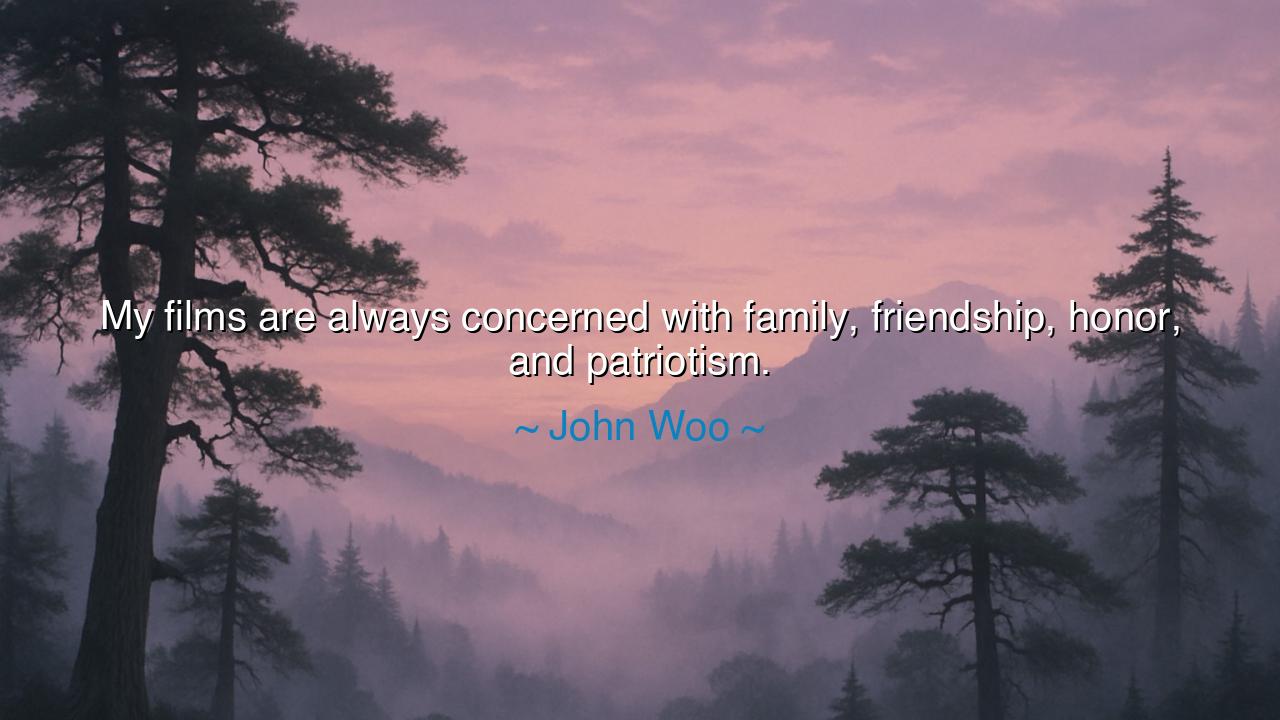
My films are always concerned with family, friendship, honor, and






“My films are always concerned with family, friendship, honor, and patriotism.” In this declaration, John Woo, the master of cinematic storytelling, reveals the foundation of his art — not spectacle alone, but the eternal truths that have guided humanity across millennia. Beneath the flares of action, the echoes of gunfire, and the ballet of motion, Woo’s heart beats with the timeless virtues of connection, loyalty, and duty. He reminds us that even in a world of chaos, the human spirit seeks anchors: the bonds of family, the loyalty of friends, the clarity of honor, and the devotion to something greater than oneself.
At its core, this quote speaks to the universality of moral and emotional values. While cinema often dazzles with fantasy and spectacle, Woo’s work is rooted in the truths that shape human experience. Family is the soil in which identity grows; friendship is the lifeline that sustains us through trials; honor is the compass that guides action when temptation or fear arises; patriotism is the recognition of belonging to a shared narrative larger than self. In each of these, Woo captures the struggles and triumphs that resonate across cultures, proving that film is not merely entertainment, but a mirror of the human soul.
The origin of this vision can be traced to Woo’s life and heritage. Born in Hong Kong, he grew up amid political turmoil and social upheaval. These experiences shaped his worldview: he witnessed both the fragility and the resilience of bonds between people, and he recognized that survival alone is insufficient without the courage to act with loyalty and integrity. Woo’s films, from A Better Tomorrow to The Killer, are infused with this understanding — their heroes may walk through violence and betrayal, yet their hearts remain guided by family, friendship, honor, and duty.
History offers countless parallels to Woo’s artistic vision. Consider the friendship of Alexander the Great and Hephaestion, whose bond endured triumph and war alike. In battle and council, their loyalty was unwavering, their honor intact. Or the devotion of Samurai clans in feudal Japan, whose sense of honor and duty to family and lord defined every action. Woo’s narratives, though modern and cinematic, echo these timeless human dramas: the struggle to remain true amidst chaos, the courage to defend what is sacred, and the nobility found in sacrifice for those one loves or the homeland.
Woo’s focus on these virtues also challenges contemporary culture, which often prizes success over principle, celebrity over character. In an age where spectacle can overshadow substance, his films remind us that emotional resonance arises from moral grounding. The gunfire and action sequences, while visually enthralling, serve as metaphors for the inner battles we all face: how to protect loved ones, honor commitments, and uphold ideals in the face of adversity. The thrill of the story is inseparable from its ethical weight, and Woo’s genius lies in weaving them together seamlessly.
The lesson of Woo’s philosophy is enduring: live your life guided by loyalty, courage, and devotion to others and to principles greater than self. Family, friendship, honor, and patriotism are not mere words; they are active practices. To cultivate these virtues is to create a life of depth and meaning, as timeless as any tale on screen. A life without these anchors, however successful or thrilling, risks emptiness, like a spectacular film without heart.
In practical life, this means making conscious choices that honor these values. Treasure your family and nurture your friendships, even when inconvenient. Act with integrity in business, community, and personal life. Serve your nation or your community with devotion, not for recognition but because the act itself is noble. Seek courage not only in dramatic moments, but in daily decisions that uphold these principles. By doing so, one lives a life worthy of the epic struggles Woo portrays, where each action resonates with meaning.
Thus, John Woo’s words remind us that storytelling — like life itself — is greatest when it celebrates the virtues that endure across time. Family, friendship, honor, and patriotism are the pillars of human dignity. Even amidst violence, uncertainty, and the chaos of fate, they provide a path through darkness, a light that guides both heroes on screen and souls in reality. To live by these ideals is to transform ordinary existence into a story of courage and grace, worthy of both legend and memory.






AAdministratorAdministrator
Welcome, honored guests. Please leave a comment, we will respond soon